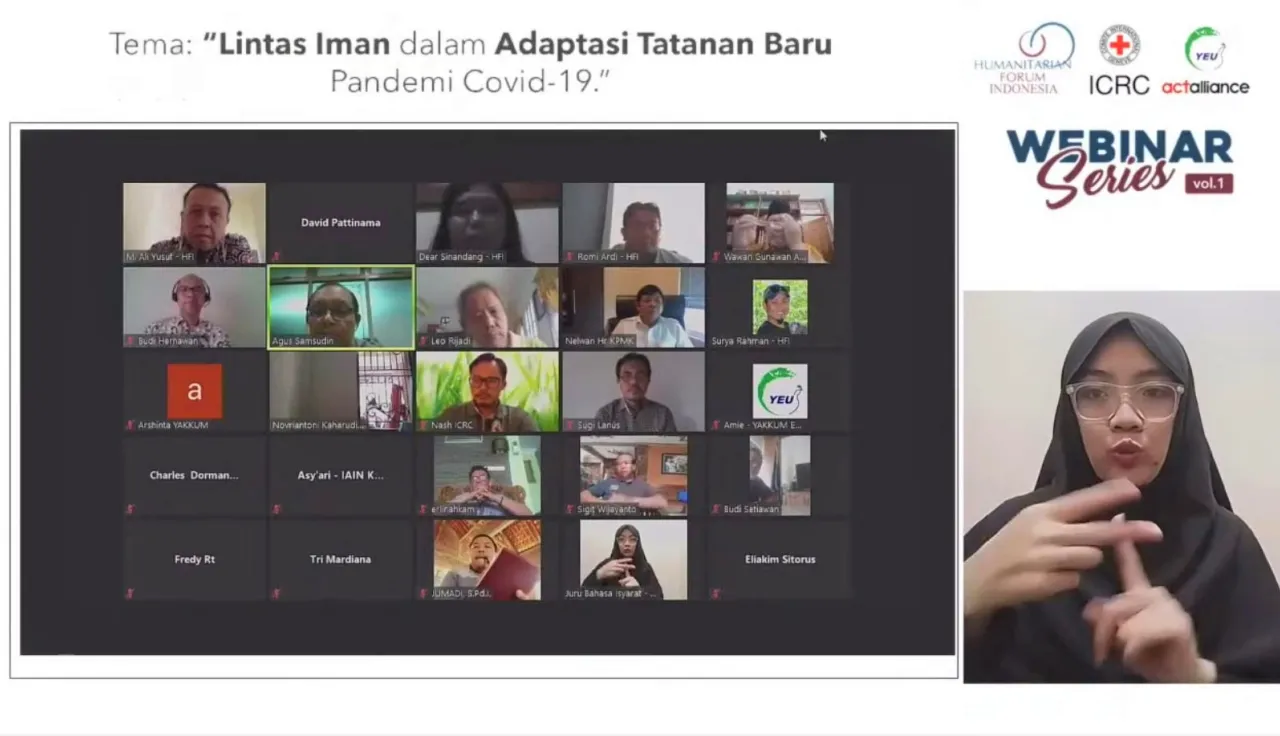Indonesia: Faith-based organizations share their experience in responding to COVID-19

The International Committee of the Red Cross (ICRC), together with Humanitarian Forum Indonesia (HFI), an umbrella organization for 17 Indonesian faith-based groups, and Christian public health organization Yakkum Emergency Unit (YEU), organized a webinar on the roles of faith-based organizations in responding to the COVID-19 pandemic.
In Indonesia, religious leaders and faith-based organisations have played a crucial role in supporting the authorities in tackling the spread of COVID-19. Religious leaders can use their influence with the community to assist in public health education while faith-based organizations provide logistical support and health services.
Representatives from religious organizations, academia, as well as government, shared their expertise in the webinar held on 29 June 2020, the second of its kind organized by the ICRC in Indonesia. To open the webinar, HFI chairman Ali Yusuf warned that in this 'new normal' era, people tend to think that the pandemic is already over, while in reality COVID-19 cases in Indonesia continue to rise. He said that faith-based organizations can play a key role in educating the public and tackling incorrect information about the virus.
Charles Dorman-O'Gowan, the ICRC's Jakarta-based regional coordinator for humanitarian affairs, explained that the ICRC aims to work with religious leaders owing to the respect and influence these leaders carry in society. The ICRC works with leaders from all faiths to promote humanitarian principles and reach populations in need.
Though it is not the ICRC's primary mandate, since the start of the COVID-19 pandemic the ICRC has worked to support faith-based organizations in their efforts to assist those in need and provide vital public health education in line with religious principles. The ICRC has also been able to assist other important stakeholders including the Indonesian Red Cross (PMI), correctional facilities, and Islamic boarding schools (Pesantren) in their efforts to control the spread of COVID-19.
In the following session, Nelwan Harahap from the Coordinating Ministry of Human Development and Culture highlighted the national modality in disaster management which brings together the private sector, CSOs and NGOs, academia, and communities including religious leaders. He stressed that close inter-sectoral cooperation is pivotal for a successful response.
The chairman of the influential Islamic mass movement Muhammadiyah's COVID-19 Command Center (MCCC), Agus Samuddin said that as Indonesia's second largest Islamic organization, Muhammadiyah applies a multi-divisional approach. At the start of the pandemic, the MCCC was created to coordinate efforts and resources from Muhammadiyah's different departments in combating the spread of COVID-19.
Agus Samuddin said that Muhammadiyah had spent 176 billion rupiah (approximately 11.8 million US dollars) on its pandemic response assisting 3.2 million people. In its response, Muhammadiyah has partnered with private companies, Australia's Department of Foreign Affairs and Trade, UN agencies and the Indonesian Zakat Agency (Baznas).
Arshinta, the director of the Extramural Christian Foundation for Public Health (YAKKUM), explained the importance of inclusiveness in COVID-19 responses. YAKKUM has worked to ensure that vulnerable and marginalized communities get access to assistance and information on how to protect themselves from COVID-19.
Arshinta praised the work of Indonesia's two biggest Islamic organizations, Nahdlatul 'Ulama (NU) and Muhammadiyah, for their publications advocating for the rights of persons with disabilities from the Islamic perspective. She also welcomed the ICRC's recent publication on management of the dead for victims of COVID-19 from a Christian perspective — see the featured documents at the end of the article.
Speaking from the perspective of indigenous and local traditions, a Hindu scholar from Bali, Sugi Lanus, discussed how Nusantara (the Indonesian archipelago) coped with plagues in the past going back to the Hindu period. He said that communities in Nusantara had an emphasis on ensuring food security which allowed them to survive during outbreaks of disease. He also said that Nusantara's spirit of 'unity in diversity' allowed groups from different ethnicities, islands and generations to work together for the collective good.
From the ICRC global affairs team, Budi Hernawan, said that dialogue with religious circles is instrumental in the pandemic response owing to the authority carried by religious leaders, their wide and anchored networks and a shared belief in upholding human dignity. Budi added that the ICRC's operational strategy on COVID-19 response in Indonesia has focused on supporting populations vulnerable to the spread of the pandemic such as students in Islamic boarding schools (pesantren) and detainees in prisons and police stations.
The ICRC has assisted with donations of personal protective equipment (PPE). He said that the ICRC's protocols on management of the dead for COVID-19 victims were an example of the integration of religious values into the discipline of forensics.
Fifty-two participants from a range of backgrounds attended the webinar. In response to one of the questions from participants during the discussion following the presentations, Arshinta said that the biggest challenge faced by humanitarian workers in the COVID-19 response was stigmatization of patients.
In concluding the webinar, executive director of HFI, Surya Rahman Muhammad, stressed that despite the great commitment shown by faith-based organizations in tackling COVID-19 there was still room to further improve through greater coordination between actors.



